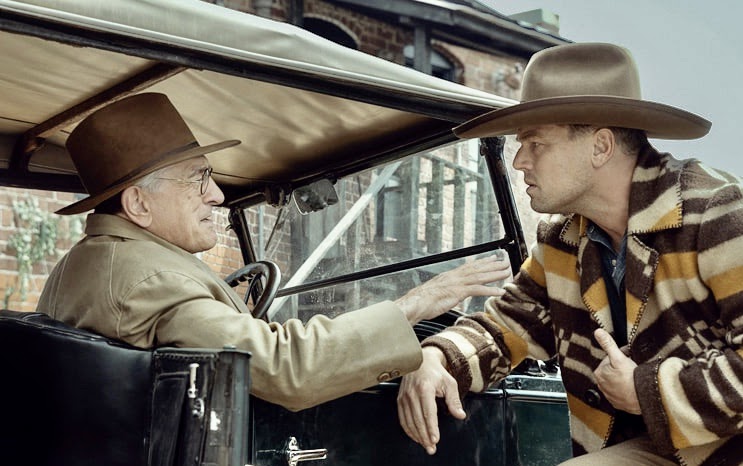Early on in Martin Scorsese’s highly anticipated adaptation of David Grann’s 2017 nonfiction novel, “Killers of the Flower Moon: The Osage Murders and the Birth of the FBI,” one can sense that this will be a film full of a lot of intense talk. This is apparent in the sit-down meeting between Leonardo DiCaprio as WWI veteran Ernest Burkhart, and Robert De Niro, and his uncle, William King Hale, a rich, revered cattle rancher.
Their conversation contains nothing surprising – it’s largely a set-up about what DiCaprio’s Ernest is going to do having come to Fairfax, Oklahoma to live, and work for his uncle in the early 1920s – but as an intro to these men, it’s a compellingly crafted scene that gives us a lot of hints via the advice of DeNiro’s King (as he wants to be called) as to not only what Ernest will face in the Osage community, but how he should and shouldn’t react.
But while that quiet scene sets the tone, and gives the audience plenty of foreshadowing; Scorsese aims to interject disturbing, stark shots depicting a number of the murders of the many Native Americans, killed because of the oil found beneath their land.
We get to see their wealth being discovered in a stunning opening sequence, going back to 1897, that features several members of the Osage Nation dancing in celebration in slow motion as they shower in the bubblin’ crude from a burst oil well. Hard for a film buff not to recall THERE WILL BE BLOOD, but Scorsese’s distinct style keeps that thought from lingering very long.
Ernest works as a chauffeur for one of the rich Osage women, Mollie Kyle (Lily Gladstone), and before long he takes a shine to her. After a courtship with an eager Ernest attempting to charm a sly Mollie, they marry, but as the ominous music below the surface tells us, evil is afoot.
The murder of Mollie’s sister Anna (a bawdy Cara Jade Myer) is one of the movie’s main mystery threads, alongside the mounting murders of the Osages, and who planted a bomb under the house of Mollie’s other sister, Rita (Janae Collins); all true episodes in what has been called the “Osage Reign of Terror.”
In their first film together under Scorsese (their first and only film together previous was Michael Caton-Jones’ THIS BOY’S LIFE in 1993), DiCaprio, and De Niro put in career-best performances. The desperation, and greed in Ernest is captured by Scorsese six-timer DiCaprio in his most unlikable, yet most engrossing character, a guy who only seems truly passionate when he’s talking about money.
De Niro, who has often been criticized for walking through movies, brings crusty, lived-in layers to King. The grand actor’s portrayal of this political boss’s power stands with his best work, and perfectly falls in line with his past collaborations with Scorsese, this being their tenth time together taking on toxic masculinity.
Gladstone provides a stoic, knowing persona for Mollie, who gives us another quietly unnerving presence in a film full of them. It’s being labeled a breakout performance, and I agree. The actress has been acting in film for over a decade in such films as FIRST COW, CERTAIN WOMEN, and THE UNKNOWN COUNTRY (which she co-wrote), but the strength of her acting here will undoubtedly put her on the movie map.
As in many Scorsese films, there are too speaking parts to give proper shout outs to, but Jesse Plemmons, who was also in the Director’s last work, THE IRISHMAN, as a gruff, humorless FBI guy does a good job, and there are interesting turns by Jon Lithgow, Scott Shepherd, and Brendan Frasier, as well as notable cameos by musicians Jason Isbell, Sturgill Simpson, and Pete Yorn.
Scorsese’s KILLERS OF THE FLOWER MOON joins David Nolan’s OPPENHEIMER in my forming best films of 2023 list. Both share the similarities of being historically themed epics with challenging running times (OPPENHEIMER is 3 hours; KILLERS is 26 minutes longer), but both justify what many might consider punishing lengths with their immersive pacing, and absorbing storylines.
Scorsese’s latest isn’t as visually flashy as Nolan’s, but cinematographer Rodrigo Prieto gives the film a sepia-tone look that gives it authentic look. I also must mention the superbly subtle, bluesy score by the late, great Robbie Robertson (his 12th collaboration with the Director), and the use of ‘20s popular music, the perfect placing of such is a Scorsese trademark.
One of my only complaints with this immaculate masterwork is that the subtitles for the Osage language aren’t consistent. The film begins with captioning being present for a character speaking the language, but in other scenes it doesn’t appear. In one crucial moment, De Niro’s King makes a declaration to a crowd in Osage – seemed like that should be subtitled.
That’s a small quibble as Scorsese’s 26th dramatic feature is a profoundly powerful picture well worth your three and a half hours. At age 80, Scorsese proves again that he’s still what it takes to make movies of vivid vitality. The excitement of seeing the legendary filmmaker bringing together his two biggest leading men to give us this magnificent piece of pure cinema is what going to the movies is all about. So don’t wait for streaming, go to it – you’ll be glad you did.
More later…

